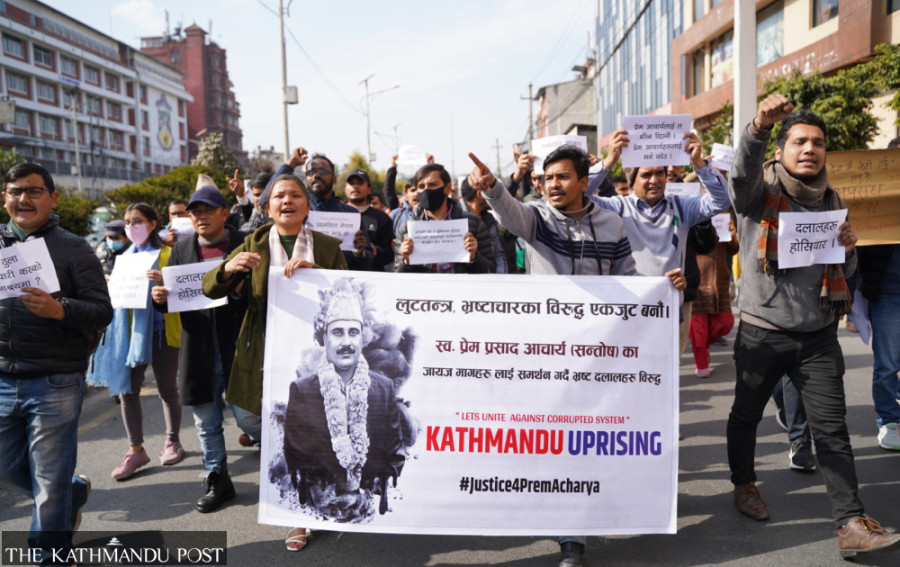Editorial
Flames of resistance
Prem Acharya set himself ablaze as a protest against the dehumanisation of ordinary Nepalis.
On Tuesday afternoon, Prem Acharya lit himself on fire in the middle of one of Kathmandu's busiest roads in a horrific protest against the system. While Acharya was covered in flames, a VVIP motorcade passed by the ghastly scene without so much as bothering to slow down and check what was going on. Stunned police officers, who were standing right there to provide security to the political big shots, sprang into action only after the procession of SUVs had passed. But by that time, Acharya had suffered burns over 80 percent of his body. He was rushed to hospital where he succumbed to his injuries in the wee hours of Wednesday. Videos showing Acharya engulfed in fire and the motorcade passing by cruelly illustrate the emotional distance between politicians and ordinary Nepalis.
As disturbing as the images of the act is the harsh reality of the dehumanisation millions of Nepalis face on an everyday basis.
That Acharya had chosen Naya Baneshwor, the nerve centre of Nepali politics, is no coincidence. This is the place that witnesses, on a daily basis, the complex stratagems of political parties to outdo one another, oblivious of the concerns of ordinary folks. This is where parliamentary democracy is turned into a zero-sum game as Members of Parliament endlessly berate each other and grapple for power. Though this is where the supreme institution representing the voice of the people is housed, the site has mostly been inaccessible to the common people. Acharya’s self-immolation is a loud and clear voice of resistance against the deafening silence of parliamentarians to people’s concerns.
Acharya seemed to have timed his act of sacrifice to coincide with the procession of VVIP cars, but he perhaps forgot that VVIPs travel in limousines with tinted windows, their eyes blinded by power. A video-crazed public also took Acharya’s self-immolation as a spectacle to be recorded on their mobile phones instead of trying to save him. As the dreadful footage spread on social media, an outraged population vented frustration against an apathetic state which sits idly by even as common Nepalis keep running into brick walls.
Acharya’s odyssey as an entrepreneur who failed multiple times but tried to rise each time is a heroic tale of resilience. Yet there were only so many failures he could withstand in the absence of a safety net on which to fall back upon when all his avenues were exhausted. In his long suicide note, he laid bare a list of a young entrepreneur’s struggles. Acharya’s resistance was not just against the state, as is evident in his suicide note. He has named some major business establishments in Nepal that didn't pay what they owed him. The state should investigate these allegations and, if true, provide compensation to Acharya’s family and punish the guilty parties.
A country where citizens have to set themselves on fire to be heard cannot be called a democratic state. Acharya’s political act of self-immolation is a call for conscientious citizens to speak up against the many social injustices imposed upon them. It is also a plea to the new government and the authorities to better address the multidimensional vulnerabilities that a common Nepali faces.




 20.53°C Kathmandu
20.53°C Kathmandu














